Key takeaways:
- Successful artist negotiations rely on open communication, mutual understanding, and emotional intelligence to foster trust and collaboration.
- Understanding an artist’s motivations behind specific requests can enhance performances and lead to a more rewarding partnership.
- Preparing effectively by researching artists and establishing clear agendas improves focus and promotes respectful dialogue during negotiations.
- Closing negotiations successfully necessitates recognizing the right timing, summarizing agreements clearly, and expressing excitement for future collaboration.
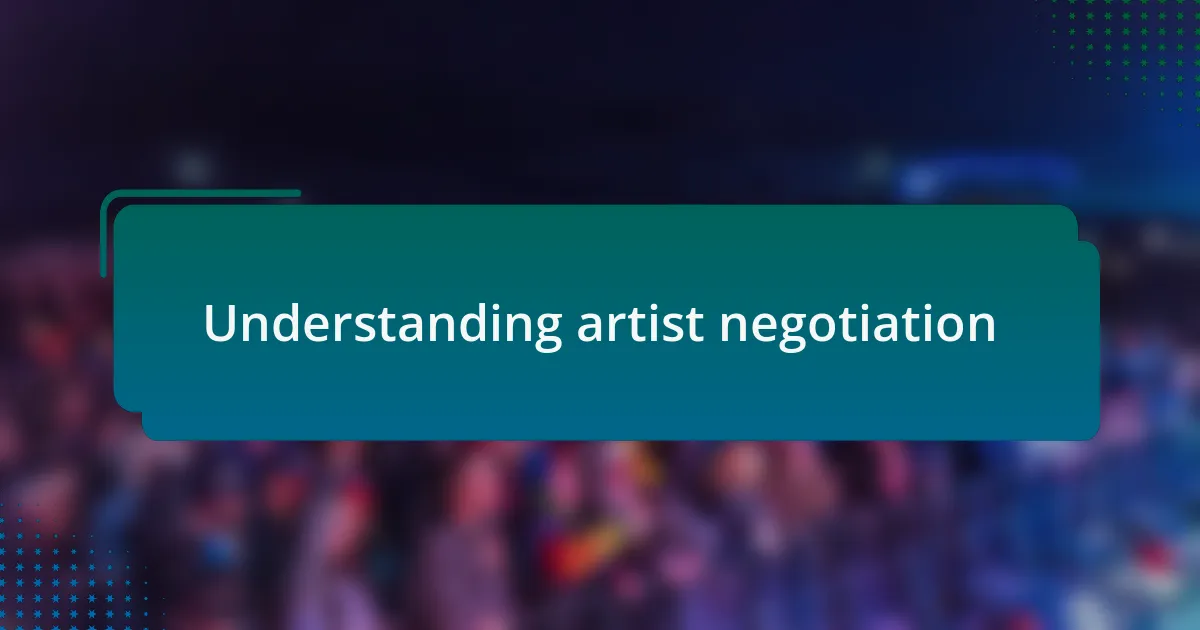
Understanding artist negotiation
Artist negotiation is a delicate dance that involves understanding both the logistical and emotional aspects of the relationship. I recall a time negotiating with a rising singer who was equally excited and nervous about the festival appearance. It was crucial to acknowledge their aspirations while ensuring the terms met our budget and vision. How do we find that sweet spot between artist goals and festival needs?
In my experience, successful negotiations often hinge on open communication. I once navigated a situation where an artist’s initial demands seemed steep, but after a heart-to-heart about their artistic vision and our constraints, we found a mutually beneficial agreement. This taught me that listening can often lead to solutions that satisfy both parties.
Additionally, it’s essential to grasp the intricacies behind an artist’s requests—they may reflect deeper concerns or aspirations. Have you ever wondered why an artist insists on certain provisions? Understanding these motivations not only fosters collaboration but also builds trust, making the entire process smoother and more enjoyable for everyone involved.
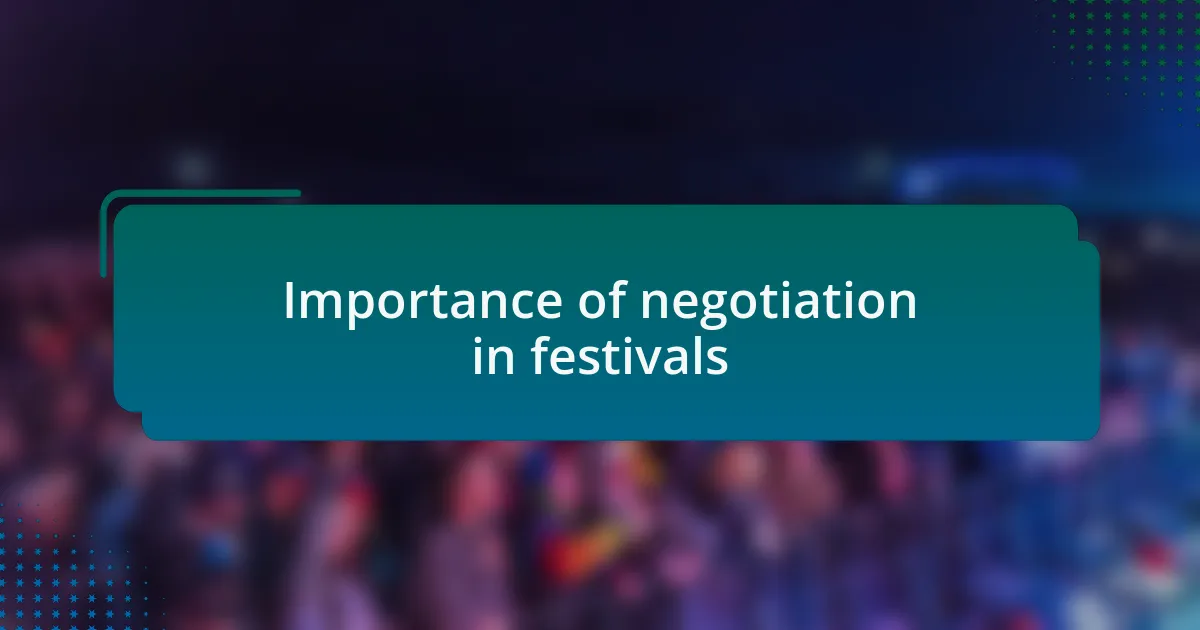
Importance of negotiation in festivals
Negotiation in festivals serves as the cornerstone for creating a balanced relationship between artists and organizers. I remember a negotiation where an artist wanted specific on-site amenities that were beyond my initial budget. Rather than dismissing their request, I took the time to understand their reasoning; it turned out those amenities were crucial for their pre-performance routine, helping them deliver a stellar show. This experience made it clear to me that accommodating certain requests can lead to enhanced performances that ultimately elevate the festival’s success.
Moreover, effective negotiation helps in establishing a culture of respect and collaboration. I once faced a situation where an artist felt undervalued due to a less-than-ideal compensation offer. By re-evaluating our approach and including them in discussions about potential promotional opportunities, we crafted a deal that not only satisfied their financial concerns but also elevated their profile at the festival. Isn’t it fascinating how showing appreciation and understanding can turn a challenging negotiation into a rewarding partnership?
At times, artists bring their own energy and creativity to the negotiation table. I vividly recall negotiating with a local band that was eager yet unsure about their worth. By encouraging them to voice their aspirations and expectations, I found common ground that both respected their talent and fit within our budget. This not only led to a positive experience for them but also infused the festival with fresh energy and excitement. Can you imagine the difference that such an engaging negotiation can make in the overall atmosphere of a festival?
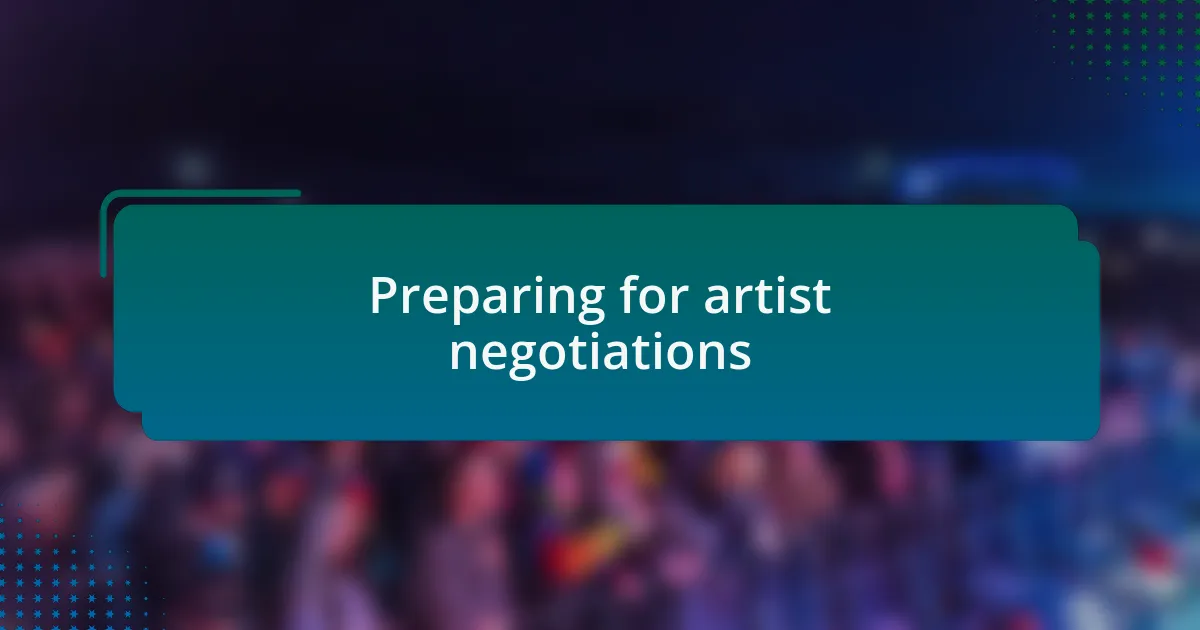
Preparing for artist negotiations
When preparing for artist negotiations, I always start by researching the artist’s previous performances and their market value. Understanding their background not only helps in framing a compelling offer but also shows respect for their artistry. I recall a time when I looked into a singer-songwriter’s unique style, which ultimately allowed me to create a personalized proposal that acknowledged their worth and drew them in.
Additionally, establishing a clear framework for negotiations is essential. I once walked into a negotiation without a set structure and quickly realized it felt chaotic. By implementing a brief agenda outlining key points, I could keep the conversation focused, ensuring that both the artist and I felt heard. Have you ever found yourself lost in negotiations? A simple roadmap can be the difference between a successful collaboration and a missed opportunity.
Emotional intelligence plays a crucial role during these discussions. The last time I negotiated with a young emerging artist, I could sense their nerves. By expressing genuine enthusiasm for their work and reassuring them that their voice mattered, I was able to create a warm atmosphere. I believe that fostering such connections can transform a transactional negotiation into a meaningful dialogue that sets the stage for a successful partnership.
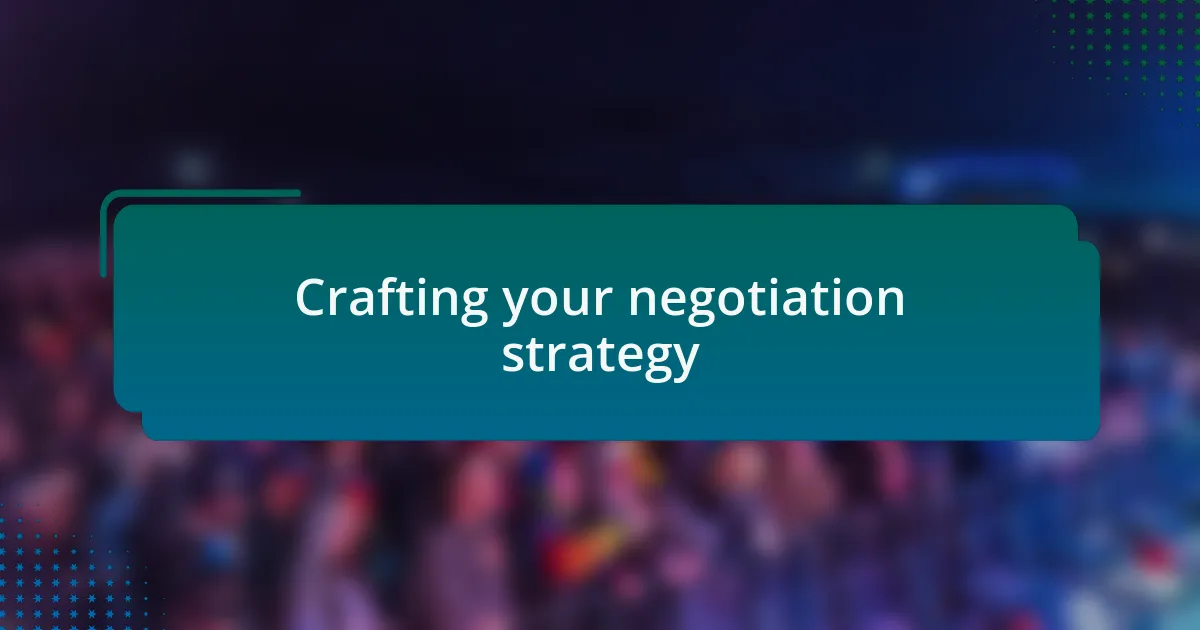
Crafting your negotiation strategy
When crafting a negotiation strategy, I focus on clear communication of my intentions. I remember a time when an artist felt wary due to misinterpretations of my proposals. By being transparent about what I valued in their artistry and how I intended to collaborate, I turned their hesitation into engagement. Have you ever noticed how clarity breeds trust?
Another essential aspect is flexibility within your strategy. I once found myself in a situation where a headliner had specific requirements that weren’t initially in my plan. Instead of standing firm, I adapted my approach, exploring options that still worked within our budget. This not only salvaged the deal but actually fostered a more innovative collaboration. Have you considered how being adaptable can open new doors?
Finally, I emphasize setting clear outcomes for both parties. In one negotiation, I established a mutual goal that extended beyond the financial aspect. By highlighting our shared vision for the festival experience, I created a sense of partnership. It’s remarkable how aligning goals can motivate artists and their management to negotiate more enthusiastically. What goals do you envision setting in your future discussions?
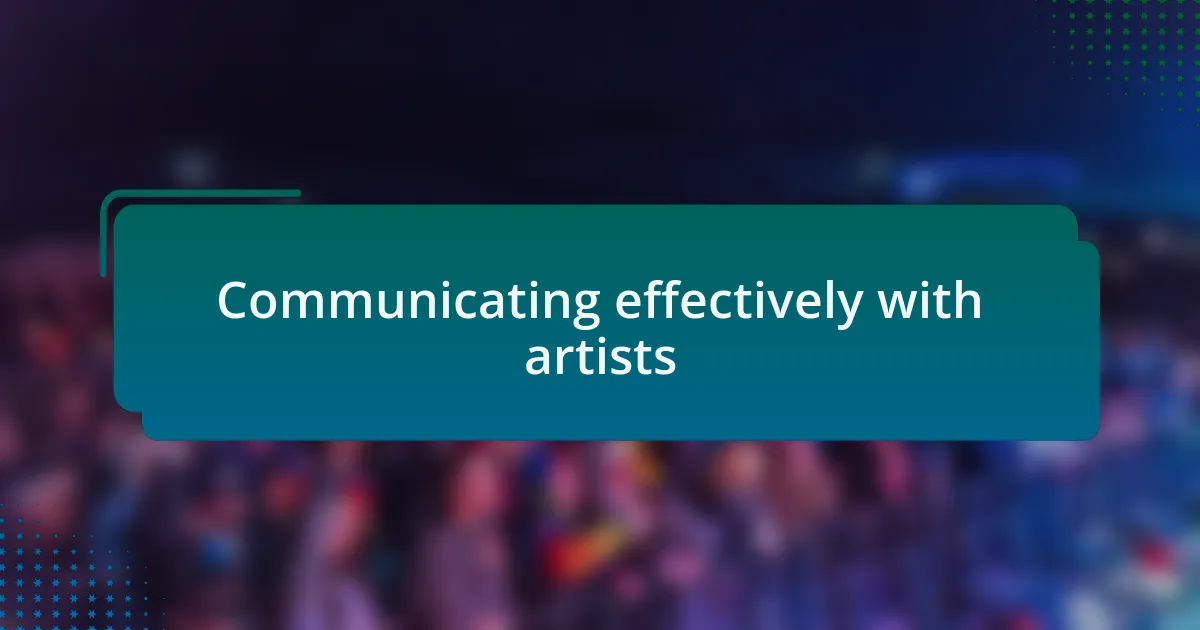
Communicating effectively with artists
The key to effective communication with artists starts with active listening. I’ve had moments where I approached an artist with a pre-formed idea, only to realize that their vision was entirely different. By taking the time to truly understand their perspective, I not only built rapport but also crafted a proposal that genuinely excited them. Have you ever considered how much more dynamic a discussion becomes when you let the other party share their story first?
Maintaining openness is essential in these conversations. There was an instance when an artist candidly shared their concerns about logistical details, which I initially deemed minor. However, addressing those concerns head-on not only strengthened our relationship but also led to creative solutions I hadn’t previously envisioned. Isn’t it interesting how addressing seemingly small issues can lead to bigger innovations?
Follow-up is just as critical. After one negotiation, I sent a heartfelt thank-you note expressing my appreciation for the artist’s insights. It was a simple gesture, but it opened the doors to future collaborations. In your experience, how have follow-ups impacted your professional relationships?
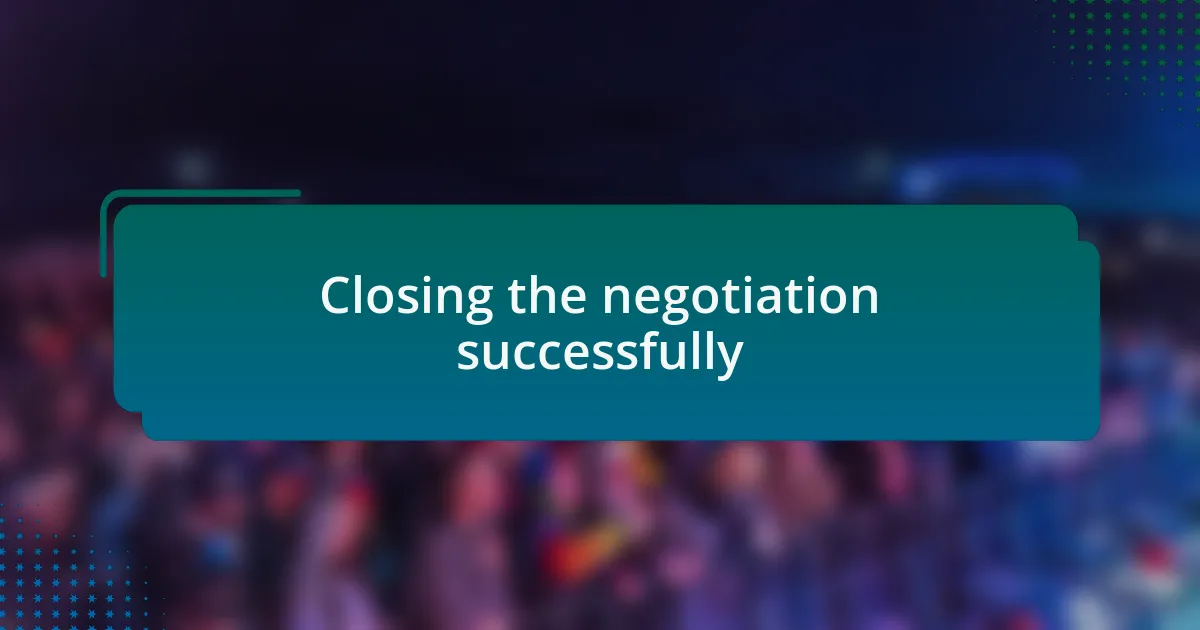
Closing the negotiation successfully
Closing a negotiation successfully requires a keen understanding of timing and mutual benefit. I once found myself in a tense negotiation with an emerging artist whose passion was evident, but so was their apprehension about accepting a lower fee. I took a moment to emphasize how their participation in our festival could enhance their visibility while ensuring they felt valued. It was that alignment of interests that allowed us to reach a satisfying compromise.
Another vital aspect is recognizing when to bring the conversation to a close. I recall a negotiation where I sensed the artist was growing weary. Instead of pushing further, I offered a clear summary of our agreement and invited them to share any last thoughts. This strategy not only solidified our agreement but also left them feeling respected and heard. How often do we mirror our eagerness to finalize everything without allowing space for the other party’s final input?
Lastly, I always remind myself that the end of a negotiation is just the beginning of a professional relationship. After successfully concluding an agreement, I make it a point to express genuine excitement about collaborating. I’ve found that when artists feel that their contribution is truly appreciated, it lays the groundwork for seamless future interactions. Isn’t it incredible how a positive closing can leave both sides looking forward to what’s next?